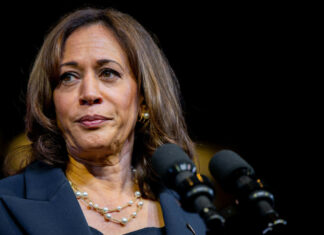Buhari’s patriotic sentiments are hardly translated to action.
You may hold President Muhammadu Buhari for failing in many areas but not on creating soundbites and stimulating patriotic sentiments. He however lacks the will to translate his sermons to actions.
If you had watched him on Wednesday, as he reminded his colleagues in the then Congress for Progressive Change (CPC) of what Nigeria has gone through in the last 56 years and the need to build a harmonious country, you might go away with the impression of seeing a President who cared so much for his compatriots.
Nigeria, Buhari said, has gone through many troubles from January 15, 1966, which resulted in the killing of a million of the citizenry in order to keep the country together. He therefore urged political leaders to stay focused and uphold the ultimate objective of promoting interest of the country, saying “we are Nigerians, God willing, we remain Nigerians, and Nigeria shall remain one.’’
Give it to him; he is a man of great words. But little in execution! What is not certain is what runs through his mind when he makes such populist pronouncements. But what is certain is that he hardly translates them into action.
READ ALSO:
Recall his appeal to Nigerians on January 1, 1984 when he and other military officers overthrew the civilian government of President Shehu Shagari. The National Party of Nigeria (NPN) – controlled Shagari government, at that time, had failed Nigerians in many respects. Apart from not delivering the axiomatic democracy dividends to the people, it had literally elevated corruption to the status of national philosophy. The carriage of the senior members of the administration, was quite nauseating.
The leadership at all levels of the government engaged in wanton frivolities, while Nigerians suffered. At some point, scornful jokes of officials partying all night and even washing their hands with Champagne and other costly drinks made the rounds. The Minister for Transport at the time, Umaru Dikko, even sniggered that talks of Nigerians suffering, were mere gossips since the people were not rummaging through the waste bins in search of food.
To cap it all, the 1983 general election which many had waited for to vote out the government, was massively rigged in favour of the administration. The mood in the land was abysmally low. For the people, therefore, anything that could sweep off Shagari and his men, was readily welcome.
It was in such despondent situation that the military guys struck and were hailed. Buhari who was made the head of state, came into office as an angry general, expressing disappointment that the politicians had wrecked the country and put the economy in serious predicament. As Dan Agbese, the celebrated NEWSWATCH columnist noted, he was also pained that Nigeria had been afflicted by a crisis of confidence and considered risky country to do business with, forcing its trading partners to deny it lines of credit. Young Nigerians were checking out in search of greener pastures elsewhere.
In what seemed the needed assurance for the day, Buhari advised; “This generation of Nigerians and indeed future generations have no other country than Nigeria. We shall remain here and salvage it together.” The plea touched the people and became for them, a mantra for patriotism and rebuilding the nation.
But few months into the administration, it became obvious that the head of state had no clear cut programme and policies at fixing the country. He rather alienated himself from the people. The economy sunk deeper, inflation rose higher and basic food items, scarcer. The ill-advised currency change, which seemed targeted at some people, further put pressure on the system.
At the international front, Nigeria was losing it by the day, as it was serially being abandoned by its traditional friends. At home, the human rights record of the administration was piteous, with journalists and critics of the government hurled into detention on flimsy grounds. It was certain that Buhari had lost the goodwill he initially enjoyed, hence when he was removed by some members of his cabinet headed by General Ibrahim Badamasi Babngida (IBB), the fall was not totally unexpected.
Buhari has not outgrown that attitude of raising the people’s hopes and not sustaining them, even as a civilian President. In 2015, at his inauguration for his first term, he had told Nigerians that he belonged to all and to nobody. But his actions have been to the contrary. In his appointments, policies and programmes, he has shown clearly that he belongs more to his Fulani Muslim kinsmen of the North, to the exclusion of other sections of the country, especially the Igbo.
In 2019 when he campaigned on the punch-line of taking Nigeria to the Next Level, it was thought that he would change his style of governance and focus it on the path of national recovery. The situation has unfortunately become worse. As it is, the economy is in dire shape than ever before, with inflation, unemployment assuming frightening dimensions. The standard of living dips each day. Nigeria under Buhari, has since 2018 been ranked the poverty capital of the World. Insecurity has made life meaningless to the citizens and has resulted to the country being lumped together with Iraq and Afghanistan, as the most terrorised nations in the World, for four years running.
So, when the President asks Nigerians to stay focused and uphold the ultimate objective of promoting interest of the country, he has a big role to play for that to happen. He occupies a significant position in the making and unmaking of Nigeria, today. He is like the proverbial tallest building in the market place which everyone looks at. It was not for nothing that the 33rd US President, Harry Truman, put a sign on his White House Office, “The buck stops here”, meaning that at the level of the presidency, there is no more room for blame game on what goes wrong in the system.
The Presidency, as it is said, is not a prize to be won but a duty to be done. This is a particular aspect of the job that Buhari has not adverted his mind to. He cherry picks, taking credit when it goes right, blaming others for lapses and at worst, reducing state matters to the abysmal context of ‘us and them’. This is not what is expected of a leader.
The 2023 election is merely a matter of months ahead. He has pledged transparent poll and bequeathing to Nigerians a legacy of credible election. He may have gotten away with similar unfulfilled promises in the past but certainly not on this. Eyes are on him, this time around.













